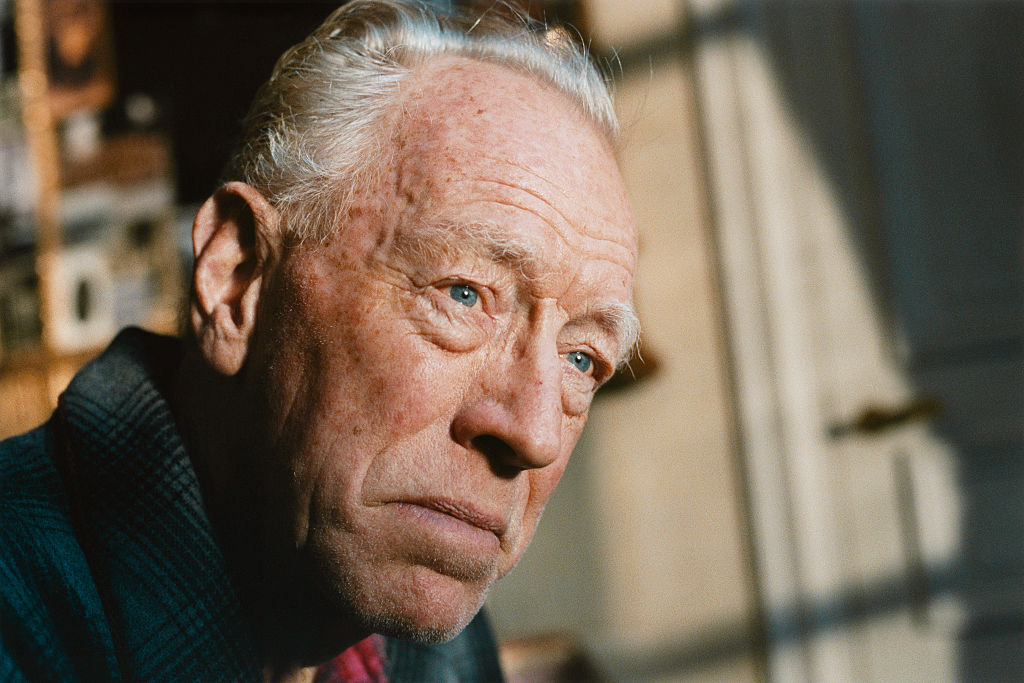
Even if you’ve never seen an Ingmar Bergman movie, you know Max von Sydow.
That’s because, in addition to being one of the greatest actors of both the last century and the early years of this one, he simply worked—a lot. Though he was the first Swedish actor to become an international movie star, he sustained a career of more than 60 years by taking character roles, and never gave less than his all. He played the devilishly cartoony villain Emperor Ming in 1980’s Flash Gordon. If Sir Alec Guinness gave the early Star Wars-franchise movies a touch of class, von Sydow stepped in later to do his part, as elderly explorer dude Lor San Tecca in 2015’s Star Wars: Episode VII—The Force Awakens. Game of Thrones fans know him as the Three-Eyed Raven. He even showed up as an absurdly dignified dignitary in a 2007 Jackie Chan-Chris Tucker movie, Rush Hour 3.
If you’ve seen any of those ostensibly “lesser” performances by Von Sydow, who died on March 8 at age 90, you’ve still seen greatness in action. There are actors who won’t take a part they feel is beneath them; von Sydow took roles that might have looked puny on the page and he elevated them to his standards. Beginning with the movies he made with Ingmar Bergman—their first was the stark allegorical chiller The Seventh Seal, in 1957—he showed a range and depth that few other actors of his generation achieved. And most important of all, his work—in Bergman’s films in particular—is a reminder of the way actors, at their best, can drive home the complexity of the human spirit. In a world of reductive thinking and knee-jerk responses, a von Sydow performance always demands that you slow down and see.
In The Seventh Seal, von Sydow’s Antonius Block—a knight returning from the Crusades to find his country decimated by plague—is a strapping specimen of manhood coming face-to-face, literally, with his mortality. His virility is all there in his very being: It’s as if the spirit of masculine confidence has been poured into the contours of his face. His stride is mighty, like the trees of the forest mysteriously come to life. But even this character, a man built for conquering, rises to his duty as a human being. Von Sydow was, like Laurence Olivier, a great physical actor; you always got a sense of the soul within the body.
Von Sydow was nominated twice for an Academy Award, first for his lead role in Pelle the Conquerer (1987), and later for his supporting performance in Extremely Loud and Incredibly Close (2011). He was a bold, magnificent actor, even in his later years, and yet within that context his subtlety was extraordinary. In The Diving Bell and the Butterfly (2007), he plays the frail—yet still performatively macho—elderly father of a man who has been rendered almost completely paralyzed by a stroke (Mathieu Amalric). He’s unable to fully reckon with his son’s condition, even as he, roughly around 90, soldiers on. His composure disintegrates during a phone conversation, as he tries to wish his son a happy birthday. The moment is so naked, so unguarded, that you almost want to look away. Our most robust actors are often the ones who best convey the fragility of life.
And even when von Sydow glowered, as many of his roles required him to do, the expansiveness of his spirit always showed through. His face, so stalwart and trustworthy, could bring us nose-to-nose with truths we’d rather not face. In Bergman’s great Shame (1968), von Sydow plays a husband (to the luminous Liv Ullman) who’s childish, selfish and ultimately cruel. And yet you feel for him. Great movies, along with great books, are our best training ground for learning how to hold several ideas in our heads at once. And in films, actors are the people best positioned to help us see facets of ourselves, sometimes even those we’re uncomfortable with. You could look at every von Sydow performance and compose from them a sort of symphony. It would be the sound of who we are at our best, at our worst and everything in between. He was fearless, and he was also, often, fun.
There are no small roles, as long as the legacy of von Sydow survives.
More Must-Reads From TIME
- The 100 Most Influential People of 2024
- The Revolution of Yulia Navalnaya
- 6 Compliments That Land Every Time
- What's the Deal With the Bitcoin Halving?
- If You're Dating Right Now , You're Brave: Column
- The AI That Could Heal a Divided Internet
- Fallout Is a Brilliant Model for the Future of Video Game Adaptations
- Want Weekly Recs on What to Watch, Read, and More? Sign Up for Worth Your Time
Contact us at letters@time.com